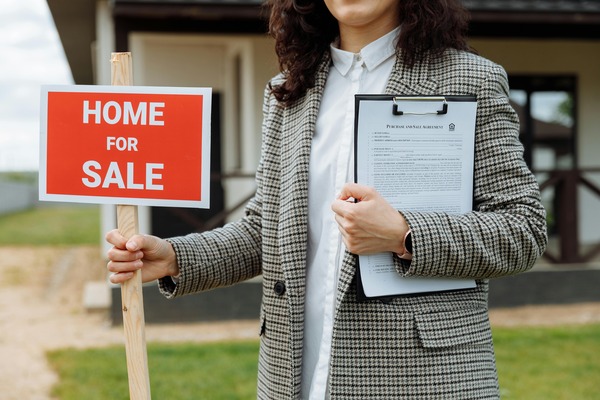What Happens to Your House Following a Relationship Breakdown?

Relationship breakdowns can be tough for so many reasons. In addition to navigating the pain of heartbreak, we’re often also required to come to terms with the loss of life as we knew it. Sometimes, things don’t turn out quite the way we’d hoped and that can really hurt.
Often, it’s not just a partner we’re forced to say goodbye to; sometimes it’s shared friends, years’ worth of memories, and the homes we built together.
Splitting up with someone you co-own a house with can be incredibly draining on both your wellbeing and your wallet. Sometimes, a house can feel like a bind, drawing us back together, when perhaps all we want is a clean break and the freedom to move on and rebuild ourselves.
In an ideal world, there are two solutions to this situation: either one partner buys the other out of the house or both parties agree to sell the property and split any profit.
However, anyone who has ever been in this position knows that things are very rarely straightforward, with an array of factors that can complicate things, including any children you share, whether you’re married or co-habiting, and even how amicable (or not) the split.
So, what does happen to your house after a relationship breakdown and how should you navigate the process to make it as stress-free as possible? We’ve put together a guide that we hope will help you work through your options and provide an idea of what you might expect along the way.
Please note that this article covers couples who own a home with a mortgage with both names on the deed, rather than those in rented accommodation.
1. Look after yourself
From dealing with the prospect of losing our home to suddenly finding ourselves without the person we once cared for, separations can be tough on our mental health for so many different reasons.
If your mental health is suffering, please know that you can access free support from a range of charities, including Mind, Samaritans, Rethink Mental Illness, and Campaign Against Living Miserably (CALM).
2. Avoid making rash decisions
When a relationship ends, it’s normal for a whole host of emotions to erupt. While it’s easier said than done, try to refrain from making snap decisions based on your current emotional state.
If you find yourself contemplating doing something you think you might later regret (such as sending your ex-partner a text telling them they can keep the house as long as you never have to see them again), put your phone down and give yourself some space to breathe. Go for a walk or talk through your feelings with someone you trust.
Cry and yell into a pillow if you have to (many of us have been there!).
3. Talk through your options
We understand that this can be tricky, especially if you and your partner have ended on bad terms, but calmly discussing your options and putting a plan in place could save you both a lot of stress. Ask each other what you’d both like to happen in the long term, and how best you can achieve this together without causing any unnecessary upset.
Don’t feel disheartened if you and your partner are unable to agree on everything from the offset – that’s where accessing legal advice could help, which we’ll discuss later.
Being civil towards someone who may have hurt you can be frustrating but try to see this process as a means to an end. Giving in to bitterness and refusing to cooperate could prolong the situation and make it even more unpleasant.
If you’re finding it difficult to be around your partner, ask a trusted friend, family member, or even a professional mediator – preferably someone neutral to the situation - to sit in on the discussion. Having somebody impartial in the room could provide a fresh perspective and help to diffuse any tension that arises.
You can find your nearest mediator via the Family Mediation Council website.
Remember, your ex-partner has just as much right to be kept in the loop as you do, so be transparent about any steps you intend to take.
What your ex does not have the right to do, however, is intimidate, frighten, emotionally blackmail, or put pressure on you to do something you don’t want to do.
If your relationship ended due to abuse, or you feel threatened by your ex’s behaviour, you should avoid meeting up with them, especially alone. Your safety is the most important thing.
You can access free advice from a number of charities and organisations, such as Refuge, Women’s Aid, Men’s Advice Line, ManKind, and Shelter. The majority of these organisations offer a confidential helpline service; operating hours and further information can be found on each individual website.

4. Figure out your next steps
You’ll need to think about where you’re going to live if you intend to leave your current home. Will you be moving back in with your parent(s), finding somewhere to rent, or searching for your next property purchase? Whatever you decide to do, make sure you have a clear contingency plan. Be aware that house sales can be unpredictable and take time, as can the transferral of funds. Don’t leave yourself financially short and make sure you prepare yourself for every possible outcome.
5. Consider legal advice
Unfortunately, breakups can be confusing and messy. You may consider it helpful to obtain a solicitor to help with dividing other assets, including any shared vehicles and household goods, such as furniture. Ensure that the solicitor you choose is authorised and regulated by the Solicitors Regulation Authority (SRA). You can search for a solicitor using the SRA register here.
You can also access free guidance and information from Citizens Advice.
6. Get your house valued
Your home is going to need an up-to-date valuation to determine how much equity is in the property. Depending on the circumstances, you and your ex-partner may be hoping for very different valuation figures. For example, if you’d like to buy your ex-partner out of the house, you might want a lower valuation to reduce the amount you’ll pay your ex-partner. They, on the other hand, are likely to favour a higher valuation, meaning they could be entitled to more money. Because of this, it might be an idea to get three separate valuations carried out and go with the average figure.
It’s worth noting that the valuation price is just a rough guide to give you an idea of the property value. You can opt to try and sell your house for more but, on the other hand, it’s also possible that potential buyers will under-offer on the market value, meaning that your home could sell for less.

7. Work out what’s left to pay on your mortgage
This will determine how much equity is in the property and how much money you will each be entitled to if you decide to sell and split the profit.
Your mortgage lender should be able to help you find the most recent data if you’re struggling to locate it in your records.
If you want to buy the house from your ex-partner
- You will both need to agree on the sum of money that your partner is entitled to when they move out; a solicitor will be able to help you negotiate an exact and fair figure to suit both parties.
- Understandably, you might not have access to the amount of money required to buy your partner’s share of the equity outright. In some circumstances, it might be an option to remortgage and increase your current monthly repayments to include the sum you owe your partner. As with any financial decision, you should think carefully before deciding if this is the right option for you and seek appropriate professional advice if you need to. You should never borrow money if your repayments will put you in financial hardship.
- You’ll need to undergo affordability checks with your mortgage provider to ensure that you’re comfortably able to take on the repayments on your own. Your mortgage broker will be able to provide further advice and information and help you look into your options.
- Once you have a solo mortgage offer in place, a solicitor (either your own or your bank or building society’s solicitor) can begin the process of removing your ex-partner from the existing deeds and organising a transferral of funds (as long as they’re in agreement with this).
If you want to leave the house and your ex-partner intends to stay
- Your ex-partner will need to follow the steps above.
If you both decide to sell the house
- The equity and assets will be split. As previously mentioned, a solicitor will be able to help with the division of assets if you are unable to reach agreement.
Good to know
Both selling your home and remortgaging to accommodate a solo ownership following a split could result in early repayment charges (ERCs) for leaving your current mortgage deal before the end of the fixed term.
You should speak to your mortgage provider to find out exactly how much you could be charged.
What happens if both parties wish to keep the house?
If you’re the joint legal owners, both you and your ex-partner are entitled to stay in the property. One cannot force the other out, which could make for a very awkward situation.
Once again, this may be a good time to invite a professional mediator or family law solicitor to step in.
If you’re unable to reach a decision between you, you can ask the courts to decide. This is called a ‘financial order,’ and can be applied for via the Gov.uk website.
You should be aware that going down this route may prolong the process and make it more expensive.
Before you attend court, you will usually need to prove that you have attended mediation sessions. You do not need to attend mediation if you have been a victim of domestic abuse.
The court’s decision will be based on a variety of factors including income, financial responsibility, and the welfare of any children living in the home.
If you and your partner share Parental Responsibility for any children, the parent who the children will be spending most of their time with could be granted the house on the grounds of stability, although this is not always the case.
Final thoughts
Whether you intend to make that beautiful home your own or have your heart set on pastures new, we hope the process is as stress-free as possible. Accept that there may be some bumps along the road and things won’t always be easy as you work your way through all the emotions that breakups and altering your living situation can bring.
You’re bound to feel apprehensive as you adjust to a different way of life but hang on in there and know that better things and new adventures are on the horizon.
Finally, if your financial situation has changed following a relationship breakdown, you might be interested in reading our guide: What Benefits are Available For Single People?

Representative example: Amount of credit: £1000 for 12 months at £123.40 per month. Total amount repayable of £1,480.77 Interest: £480.77. Interest rate: 79.5% pa (fixed). 79.5% APR Representative. We’re a fully regulated and authorised credit broker and not a lender

